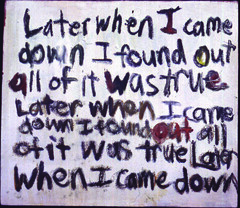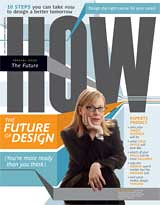Commentary: Fixing The Code
For most of my adult life I have followed a safe path. This was a conscious choice; I remember the actual moment I began the journey in vivid detail. It was in August of 1983, the summer I graduated from college; it was a hot and hazy evening. As I stood on the corner of 7th avenue and Bleecker Street in New York City, wearing pastel blue trousers and a hot pink Miami Vice-like tee shirt, as I peered deep into my future and contemplated the choice between knowing and not knowing, between the secure and the uncertain, between the creative and the logical, I chose the road I now refer to as the path of responsible resistance.
I grew up in an atmosphere that I would now describe as one of oblique and utter disarray, and my primary response as a young woman was a goal of self-sufficiency. I was bound and determined to make a success of myself, and inasmuch as I knew what I wanted deep in my heart, I was also compelled to consider what I thought was reasonable. For though I wanted what a good friend considers “the whole wide world,” I thought it might be more prudent to shoot for what was conventionally considered more responsible--or to be more specific: success that was realistically attainable.
As a result, I have lived within a fairly fixed code. I am not unhappy with what has transpired in the 20-odd years since I first had this goal, rather, on my best days, I am more curious as to the initial motivations of making this choice, the subsequent ramifications of that choice and most importantly, now, what can be built from the foundation of what I have chosen.
I think that the codes we build for ourselves are rather impressive. Though we might believe that our personal codifications are fixed and determined, because we have actually built them for ourselves and voluntarily live in the framework, they are not. Yet this does not deter us from dutifully believing in and heeding them. As a result, while we might believe that the world’s restrictions or expectations are too daunting or out of reach, what we are really doing is providing ourselves with an easy way out, and a way to save face when we look in the mirror at what we’ve created.
Then (often when we least expect it) we encounter someone more courageous, someone who chose to strive for that which might seem unrealistically unattainable. And we marvel. We swoon. We gape. Often we are in awe. I think we look at these people as the lucky ones, when in fact; luck has nothing to do with it. It is really all about our constitution, our belief in ourselves, and ultimately what we believe we are capable of. It is about how we have constructed our inner code. And though we might yearn to change that inner code, it will never change just because we desire it to. In order to make any meaningful change, we need to understand what it is we want to be different. And then comes the hard part: determining how the code can be fixed or changed.
According to Thomas Lewis in his book, “A General Theory of Love,” “The scientist and artist both speak to the turmoil that comes from having a (human) brain. A person cannot direct his emotional life the way he bids his motor systems to reach for a cup. He cannot will himself to want the right thing or to love the right person or to be happy after a disappointment or even to be happy in happy times. People lack this capacity not through a deficiency of discipline but because the jurisdiction of will is limited to the latest brain and to those functions within its purview. Emotional life can be influenced, but it cannot be commanded. Our society’s love affair with mechanical devices that respond at a button-touch ill prepares us to deal with the truly unruly organic mind that dwells within. Anything that does not comply must be broken or poorly designed, people now suppose, including their hearts.”
One of my favorite quotes from John Maeda’s book, "Design By Numbers," is this: “The computer will do anything within its abilities, but it will also do absolutely nothing unless commanded to do so.” I think we humans are like that too—we will continue to obey our own codes and our personal codifications until we crash, reconfigure or upgrade. So, twenty-three years after writing my own code, I am attempting to rewrite it. But for now, I can only view it as a work in progress, as the new code I am considering is not fully known to this author. Thus far, it is not something that I can articulate; it is not something I can describe scientifically or artistically. It is still just a code in progress.
In the grand scheme of a life, maybe (just maybe) it is not about knowing or not knowing, choosing or not choosing. Perhaps what is truly known can’t be described or articulated by either creativity or logic, science or art—but perhaps with the most authentic and meaningful combination of the two: poetry. As Robert Frost once wrote, “A poem begins as a lump in the throat, a sense of wrong, a homesickness, a love sickness. It is never a thought to begin with.”
I grew up in an atmosphere that I would now describe as one of oblique and utter disarray, and my primary response as a young woman was a goal of self-sufficiency. I was bound and determined to make a success of myself, and inasmuch as I knew what I wanted deep in my heart, I was also compelled to consider what I thought was reasonable. For though I wanted what a good friend considers “the whole wide world,” I thought it might be more prudent to shoot for what was conventionally considered more responsible--or to be more specific: success that was realistically attainable.
As a result, I have lived within a fairly fixed code. I am not unhappy with what has transpired in the 20-odd years since I first had this goal, rather, on my best days, I am more curious as to the initial motivations of making this choice, the subsequent ramifications of that choice and most importantly, now, what can be built from the foundation of what I have chosen.
I think that the codes we build for ourselves are rather impressive. Though we might believe that our personal codifications are fixed and determined, because we have actually built them for ourselves and voluntarily live in the framework, they are not. Yet this does not deter us from dutifully believing in and heeding them. As a result, while we might believe that the world’s restrictions or expectations are too daunting or out of reach, what we are really doing is providing ourselves with an easy way out, and a way to save face when we look in the mirror at what we’ve created.
Then (often when we least expect it) we encounter someone more courageous, someone who chose to strive for that which might seem unrealistically unattainable. And we marvel. We swoon. We gape. Often we are in awe. I think we look at these people as the lucky ones, when in fact; luck has nothing to do with it. It is really all about our constitution, our belief in ourselves, and ultimately what we believe we are capable of. It is about how we have constructed our inner code. And though we might yearn to change that inner code, it will never change just because we desire it to. In order to make any meaningful change, we need to understand what it is we want to be different. And then comes the hard part: determining how the code can be fixed or changed.
According to Thomas Lewis in his book, “A General Theory of Love,” “The scientist and artist both speak to the turmoil that comes from having a (human) brain. A person cannot direct his emotional life the way he bids his motor systems to reach for a cup. He cannot will himself to want the right thing or to love the right person or to be happy after a disappointment or even to be happy in happy times. People lack this capacity not through a deficiency of discipline but because the jurisdiction of will is limited to the latest brain and to those functions within its purview. Emotional life can be influenced, but it cannot be commanded. Our society’s love affair with mechanical devices that respond at a button-touch ill prepares us to deal with the truly unruly organic mind that dwells within. Anything that does not comply must be broken or poorly designed, people now suppose, including their hearts.”
One of my favorite quotes from John Maeda’s book, "Design By Numbers," is this: “The computer will do anything within its abilities, but it will also do absolutely nothing unless commanded to do so.” I think we humans are like that too—we will continue to obey our own codes and our personal codifications until we crash, reconfigure or upgrade. So, twenty-three years after writing my own code, I am attempting to rewrite it. But for now, I can only view it as a work in progress, as the new code I am considering is not fully known to this author. Thus far, it is not something that I can articulate; it is not something I can describe scientifically or artistically. It is still just a code in progress.
In the grand scheme of a life, maybe (just maybe) it is not about knowing or not knowing, choosing or not choosing. Perhaps what is truly known can’t be described or articulated by either creativity or logic, science or art—but perhaps with the most authentic and meaningful combination of the two: poetry. As Robert Frost once wrote, “A poem begins as a lump in the throat, a sense of wrong, a homesickness, a love sickness. It is never a thought to begin with.”



















5 Comments:
Dropped by. Liked the site. Liked the art. Be happy.
That you are even asking the question should tell you that something is broken.
Debbie, stop standing at the edge of the diving board and staring at the water below. Close your eyes and jump.
debbie. it is courageous that you even think this way. i admire that afrter all you have accomplished you still wnat more and still are striving for what makes you happy. you are an inspriation to so many. thank you.
You're not an inspiration to me. You're so stuck in your own narcissism that i doubt you'll ever see past it. Even your art, though skillful, is about "me, me, me." Whew, your blog is exhausting.
Dear "Anonymous":
Thanks for the feedback.
Sorry my "narcissism" so exhausting. I would recommend you spend as much time as you are spending on this blog somewhere else.
Post a Comment
<< Home